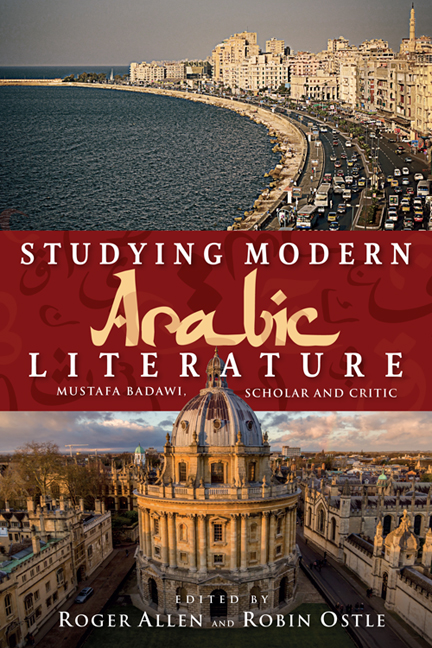Book contents
- Frontmatter
- Contents
- List of Figures
- Introduction
- Part I Alexandria to Oxford
- Part II The Academic Legacy
- 5 Beginning and End: Exploring the Qur'anic ‘Grand Story’
- 6 Modern Arabic Literature as Seen in the Late Nineteenth Century: Jurji Murqus's Contribution to Korsh and Kirpichnikov's Vseobshchaya Istoria Literatury
- 7 The ‘Second Journey’ (Al-Rihla al-thaniya) of Muhammad al-Muwaylihi's Hadith 'Isa Ibn Hisham Revisited
- 8 Ataturk Becomes 'Antar: Nationalist-vernacular Politics and Epic Heroism in 1920s Egypt
- 9 Jewish Arabs in the Israeli Asylum: A Literary Reflection
- 10 Strange Incidents from History: Youssef Rakha and his Sultan's Seal
- 11 Towards a Comparative Approach to Arabic Literature
- 12 Does Literature Matter? The Relationship between Literature and Politics in Revolutionary Egypt
- Notes on the Contributors
- Index
10 - Strange Incidents from History: Youssef Rakha and his Sultan's Seal
from Part II - The Academic Legacy
Published online by Cambridge University Press: 05 August 2016
- Frontmatter
- Contents
- List of Figures
- Introduction
- Part I Alexandria to Oxford
- Part II The Academic Legacy
- 5 Beginning and End: Exploring the Qur'anic ‘Grand Story’
- 6 Modern Arabic Literature as Seen in the Late Nineteenth Century: Jurji Murqus's Contribution to Korsh and Kirpichnikov's Vseobshchaya Istoria Literatury
- 7 The ‘Second Journey’ (Al-Rihla al-thaniya) of Muhammad al-Muwaylihi's Hadith 'Isa Ibn Hisham Revisited
- 8 Ataturk Becomes 'Antar: Nationalist-vernacular Politics and Epic Heroism in 1920s Egypt
- 9 Jewish Arabs in the Israeli Asylum: A Literary Reflection
- 10 Strange Incidents from History: Youssef Rakha and his Sultan's Seal
- 11 Towards a Comparative Approach to Arabic Literature
- 12 Does Literature Matter? The Relationship between Literature and Politics in Revolutionary Egypt
- Notes on the Contributors
- Index
Summary
Youssef Rakha's Kitab al-tughra (Book of the Sultan's Seal), his first novel, set in the spring of 2007 and completed at the start of 2010, was published less than a fortnight after mass protests centred on Cairo's Tahrir Square had forced the resignation of the then Egyptian President Hosni Mubarak on 11 February 2011 – a move that prompted the transfer of power to the Supreme Council of the Armed Forces (SCAF), and everything that has followed since. As Mona Anis observed a few weeks later in Al-Ahram Weekly, this may have been an unfortunate rather than a fortunate coincidence, since ‘a historical event of such wide import as the Egyptian uprising will naturally overshadow the appearance of any new novel, no matter how accomplished’. Fortunate or not, however, the timing of the novel's publication makes an attempt to relate its appearance to current developments in Egypt and the wider Middle East almost inevitable – not only because of the obvious relevance of its central themes (to which we shall return later) to contemporary developments and debates but also because the setting of much of the work overlaps with that of the uprising itself – an area of central Cairo renamed by Rakha, in his ‘alternative map’ of the city, ‘World's Gate’ (Bab al-dunya).
The appearance of Rakha's work prompted enthusiastic – not to say hyberbolic – reactions in some literary circles. Mona Anis herself was complementary but restrained, describing the work simply as ‘an outstanding first novel by an author who has a special ability to deal with modern and classical material, both Arab and western, with equal ease’, and adding that ‘[one] looks forward to further novels with eager anticipation’. Others had higher hopes for the work. Writing in her ‘Arabic Literature in English’ blog, M. Lynx Qualey noted that:
Another novel that was published just at the time of the uprising in Egypt – that I'm expecting will be nominated for the IPAF [International Prize for Arabic Fiction] – is Youssef Rakha's Book of the Sultan's Seal, published by Dar el Shorouk.
- Type
- Chapter
- Information
- Studying Modern Arabic LiteratureMustafa Badawi, Scholar and Critic, pp. 159 - 177Publisher: Edinburgh University PressPrint publication year: 2015

